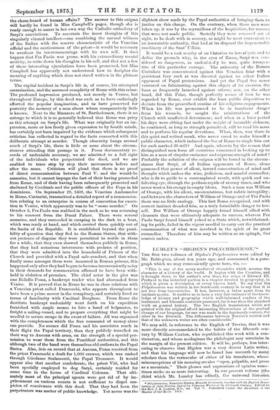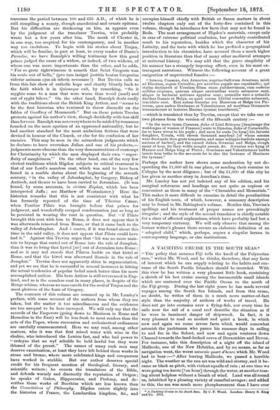LUMLEY'S "HIGDEN'S POLYCHRONICON." THE first two volumes of Iligden's Polyehronicon
were edited by Mr. Babiegton, about ten years ago, and announced in a para- graph which we may conveniently quote here, viz. :— "This is one of the many modireval chronicles which assume the character of a history of the world. It begins with the Creation, and is brought down to the author's own time, the reign of Edward III. Prefixed to the historical portion is a chapter devoted to geography, in which is given a description of every known land. To say that the Polychronicon was written in the fourteenth century is to say that it is not free from inaccuracies. It has, however, a value apart from its intrinsic merits. It enables us to form a very fair estimate of the know- ledge of history and geography which well-informed readers of the fourteenth and fifteenth centuries possessed, for it was then the standard work on general history. The two English translations which are printed with the original afford interesting illustrations of the gradual change of our language, for one was made in the fourteenth century, the other in the fifteenth. The differences between Trovisa's version and that of the unknown writer are often considerable."
We may add, in reference to the English of Trevisa, that it was more directly accommodated to the habits of the fifteenth cen- tury by William Caxton, who republished this work with a con- tinuation, and whose neologisms the philologist may scrutinise in the margin of the present edition. It will be, perhaps, less inter- esting to observe that Hig,den was a very decent Latin writer, and that his language will now be found less uncouth by many scholars than the vernacular of either of his translators, whose misconceptions of his meaningare also "open, palpable, and gross as a mountain." Their glosses and expressions of opinion some- times strike us as more interesting. In our present volume (the third which Mr. Lumley has edited), the universal historian
Po? yehronieon, Ranulphi Ifigden, Nonacid Cagrensis, together with the Englieh Naas- tallow of John Treviso, and of an Unknown Writer of the illteenth Century. Edlied by the Bey.). R. Lumley, B.D, at. VOL V. Published under the direction of the Master of the Bolls. 1874.
traverses the period between 100 and 635 A.D., of which he is still compiling a scanty, though anecdotical and ornate epitome. But his difficulties are thickening on him, as appears even by the judgment of the translator Trevisa, who probably wrote but a few years after him. The monk of Chester is, in one way, too sceptical for his contemporary, and in another way too credulous. To begin with his stories about Trajan, which will be familar, in part at least, to every reader of Dante's Paradise, we have Ranulph's willing testimony how this good prince judged the cause of a widow, or indeed, of two widows, of whom one was more importunate than the other, and he adds, "For so grete rightwisnesse it semeth that Seint Gregorie wan his soule out of belle," (pro tam insigni justitia beatus Gregorius videtur animam ejus ab inferis revocasse!) But Trevisa calls us from this fair show of catholic hope and charity bluntly back to the faith which is in Quicunque vult, by remarking, "So it myghte seme to a man that were worse than wood (mad) and out of ryght bileve." On the other hand, Ranulph deals coolly with the traditions about the British King Arthur, and "seems to be the first historian who ventured to throw discredit on the fables of Geoffrey of Monmouth." But on these points Trevisa protests against his author's view, though decidedly with less skill than fervour. Ranulph was not everywhere to be misled by romances founded on the mere egotism of an oppressed nationality, but he had another standard for the most audacious fictions that were devised in honour of the Church, or else for the confusion of her enemies. This may be seen in the miraculous judgments which he declares to have overtaken Julian and one of his prefects,— judgments more obscene than the very demonstrations of contempt for Christianity by which the men displayed their own "super- fluity of naughtiness." On the other hand, one of the very few clerical traditions which Higden subjects to critical treatment is that of our Lord's seamless coat, which was said to have been found in a marble shrine about the beginning of the seventh century, "in the valley of Jehoshaphat, by Gregory, Bishop of Antioch, and thence to have been carried to Jerusalem. (It was found, by some accounts, in civitate Zaphat, which has been interpreted Jaffa; see Matthew of Westminster.) Here the historian remarks that this is not consistent with what he has formerly reported of the time of Tiberius Caesar, when Pontius Pilate was brought before that prince for judgment, and wonderfully escaped condemnation just so long as he persisted in wearing the coat in question. But "if Pilate brought this coat with him to Rome, it does not appear that it was afterwards removed from Rome, or that it came back to the valley of Jehoshaphat. And / contra, if it was found about this time in the said valley, it does not appear that Pilate could have had it." Against this Trevisa urges that "hit was no more mais- trie to brynge that curtel out of Rome into the vale of Josaphat, than it was to bring that kyrtel [sic] out of Jerusalem into Rome ; and so it may wel stonde that Pilatus hadde on that kirtel at Rome, and that the kirtel was afterward ifounde in the vale of Josaphat." Trevisa does not apparently shine in argumentation, and yet we see that he is successful in several instances in hitting the actual tendencies of popular belief much better than his more accomplished author. His hero Arthur is still reverenced in Eng- land, and so is the seamless coat in many places, in despite of the Ronge schism, whereas no man careth for the soul of Trajan and the most glorious of the feats of Gregory.
The contents of this volume are summed up in Mr. Lumley's preface, with some account of the authors from whom they are taken, but the matter is too miscellaneous and the evidences are too unequal to be here surveyed. We will only say that the records of the Emperors (going down to Maximus in Rome and Heraclius in the East) will be less fresh to most readers than the acts of the Popes, whose succession and ecclesiastical ordinances are carefully commemorated. Here we may read, among other matters, who it was that first mixed water with wine in the chalice, who introduced the Lenten fast, and who had power to " ordeyne that no wyf schulde be held lawful but they were iblessed of the preost." The names of many such men may deserve examination, at least they have left behind them works in stone and bronze, where more celebrated kings and conquerors have worked in stubble. But our author deserves special credit for his frequent mention of theological, literary, and scientific writers ; he counts the translators of the Bible, and defends warmly and discreetly the reputation of Origen ; he speaks of Galen, Hippocrates, and Ptolemy, and de- scribes those works of Boethius which are less known than the Consolations of Philosophy. Higden enters slightly into the histories of France, the Lombardian kingdom, &c., and
occupies himself chiefly with British or Saxon matters in about twelve chapters only out of the forty-five contained in this volume, though he introduces few facts that may not be found in Beda. The neat arrangement of Higden's materials, except only in eras of extreme political confusion, has probably contributed much to his reputation, besides which the character of his Latinity, and the taste with which he has prefixed a geographical introduction to his chronicles, have secured them a much higher position in literature than that of many other medimval attempts at universal history. We may add that the grave simplicity of his manner has a strangely imposing effect, even in his most ex- travagant narrations. Witness the following account of a great emigration of unprotected females :—
" Interea, Conanus, dux Armories, nuptias Gallorurn detestans, misit ad Dinotnm, regem Cornubia3, pro nxoribus popnlo suo copulandis ; qui statim destinavit ei Ursulam filiam swim pulcherrimam, cum undecem niillibus virginum, quarum aliquas savientibus vents submerase aunt, aliqua3 in barbaras nationes appulsa3 snot; nonnullte verb a nefandis ducibus Guanio et Melga, eo (pod eorum libidini consentire nolnerant, trucidata aunt. Erat autem Guanius rex Hunorum at Melga rex Pic- tornm, quos ambos Gratianus et Valentinianns ad maritima Germania transmiserant nt fautores Maximi tyranni trucidarent,"
—which is translated thus by Trevisa, except that we take one or two phrases from the version of the fifteenth century :-
"In the mene tyme, Conanus, duke of Litel Briteyne [despisenge the weddenges of women of Fraunce] sente to Dynotus, duke of Cornewaille, for to have wives to his peple ; and anon he sente [to hym] his faireste daughter, Ursula, with eleven thousand maydens [of whom somme were drownede thro grete tempestes, and some schippes londede amonge nacions of barbre], and the cursed dukes. Gwanius and lklelga, slough meny of hem, for they wolde nought assent, &c. Gwanins was kyng of bones and Melga king of Pictes ; Gracianus and Valentinianns hadde iaende hem both° to the see-costa for to gee the fautonrs of Maximus the tyrannt."
Perhaps the author here shows some moderation by not de- spatching the 11,000 all in one place, or sending their remains to Cologne by the next diligence ; but of the 11,000 of this city he has given us another story in Aurelian's time.
Mr. Lumley has not yet indexed any of his edition, and his marginal references and headings are not quite as copious or convenient as those in many of the " Chronicles and Memorials." This makes it more difficult to examine in detail the peculiarities of his English texts, of which, however, a summary description may be found in Mr. Babington's volume. Besides this, Trevisa's spellings and his treatment of proper names are provokingly irregular ; and the style of the second translator is chiefly notable for a class of affected euphemisms, which have probably had but a very temporary currency. We will only observe that among the former writer's glosses there occurs an elaborate definition of an "adopted child," which, perhaps, argues a singular lacuna in contemporary language, or else institutions.































 Previous page
Previous page